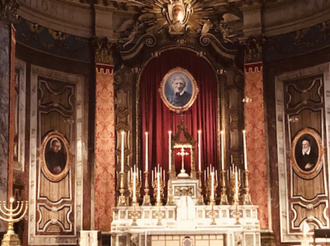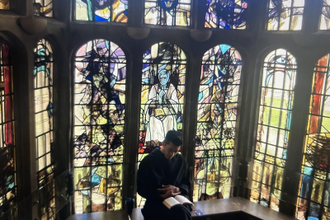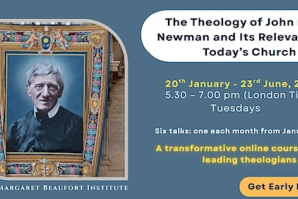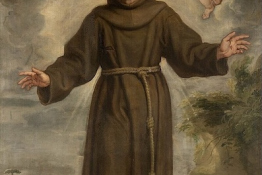Text: Fr Ignatius Harrison at Oratory Mass for St John Henry Newman

The Oratory sanctuary was decorated with same image displayed on St Peter's Square for the canonisation. Newman is flanked on the left by Bl Dominic Barberi, and on the right by St Philip Neri.
A Solemn Pontifical Mass in honour of St John Henry Newman was celebrated by Cardinal Cardinal Nichols, Archbishop of Westminster, on Thursday, 17 October. Father Ignatius Harrison, Provost of the Birmingham Oratory delivered the following homily:
1. Divine providence helped John Henry Newman to follow Saint Philip's Neri's admonition to those who wished to become holy: be humble and stay low. After The Parting of Friends in 1843, Mr Newman was no longer the high-flying leader of the Oxford Movement. He walked slowly away from the Ivory Tower in Oxford and pitched up at the Coal Face in Birmingham.
His early years as a priest in Brum were arduous. He devoted long hours ministering to the poor, the sick, and the marginalized. It must be said that serving the poor was nothing new to him. He had already done so very conscientiously as an Anglican clergyman. But as a Catholic he was personally closer to the poor than ever before.
When he first arrived in Birmingham he had no money even for a pair of new shoes. And it took his brethren in the Oratory a little while to understand why he was loth to take holidays abroad. He simply couldn't afford it.
2. As an Anglican John Henry did not choose to become a leader. But he emerged as one. As a Catholic he did not choose to promote himself. But when his honesty was impugned by Charles Kingsley in 1864 he felt compelled to write the Apologia pro vita sua. He wrote it not just to defend himself, but also all the other Catholic clergy whom Kingsley had calumniated when he wrote
As Fr Newman stood at his writing desk in our library, penning the Apologia, he wept, frequently and copiously, groaning aloud in great distress. Why? Because it was agonizing for him to make public the intimate record of his personal religious history. He would have preferred to remain unknown. He didn't care to be in the "Truth for its own sake has never been a virtue of the Roman clergy" limelight. Just one example: in 1864 he was invited by a Vatican Monsignor to address some of the smart set in Rome. The invitation said the audience would be "more educated than could ever be the case in England." Newman declined, adding a sarcastic swipe, that "Birmingham people have souls".
3. Newman continued to be well known. Many admired him. And many did not. For years, Fr Newman was under a cloud of suspicion in Rome. Some of his theological and educational ideas made people uncomfortable, especially his radical notion that the laity should be well-informed about the faith and able to defend it. In 1867 his old friend Mgr Talbot wrote to Archbishop Manning saying: "Dr Newman is the most dangerous man in England". Well, wiser counsels prevailed, and the good standing of the dangerous liberal was publicly confirmed in May 1879, when Pope Leo XIII made Fr Newman a cardinal, in recognition of his outstanding piety and erudition. In accepting the dignity Newman said "the cloud is lifted for ever".
4. Newman's deeper reason for accepting was made crystal clear in his formidable Biglietto Speech. He knew that becoming a cardinal would ratify what he called his life-long struggle against 'liberalism in religion'. He defined 'liberalism in religion' as "the doctrine that there is no positive truth in religion, but that one creed is as good as another..." He also hoped that accepting the red galero would encourage English Catholics, especially converts. But even so he accepted it on the understanding that he could continue to reside in his nido, in his own home, in his own city of Birmingham. In that nido he lived less like a prince of the Church and much more like a pauper. He lived on bare floorboards and cheap linoleum. It was difficult for his brethren to persuade him to stop wearing worn out old clothes. In community he remained simply 'Father'.
5. Saint Philip exhorts us to mortify our mind, the razionale. That can entail giving up our hard opinions, but it can also mean accepting the failure of our own cherished plans. Newman had plenty of opportunity for that sort of mortification. He devoted every fibre of his being to the Tractarian Movement. It led him personally into the Church, but overall his hopes for the Movement failed. He met with a lot of opposition when he established a Catholic University in Dublin. His methods were judged un-Catholic, especially because he wanted the teaching faculty to include laymen. He enthusiastically agreed to produce a new English translation of the Bible, but was then forced to abandon the project when Bishop Wiseman's support mysteriously evaporated. His attempt to establish an Oratory in Oxford was undermined by the stipulation from Rome that he himself should not reside there. So many of his projects came to nothing, at least during his lifetime. Just as well that St Philip had taught him, as he teaches all his sons, to take no interest in success as the world sees it. Like all saints in the making, John Henry knew that his stewardship was only temporary.
6. When the Master surveyed Newman's stewardship, what did he see? Well, of course, He saw the brilliant mind that had produced The Development of Christian Doctrine, and the Grammar of Assent. But He also saw the compassionate heart of that same man taking bags of coal to poor factory workers who were freezing to death; the same priest who regularly made private gifts of five pounds to those in need; the same priest who consistently made such efforts to help the unemployed in Birmingham find decent work, especially women; the same priest who went at his own risk to help cholera victims in other parishes.
7. In the last year of his life, Cardinal Newman went to Bournville to settle a dispute between the Quaker management at Cadbury's and the Catholic factory girls, who did not feel sweetened by their compulsory daily Bible classes. He made a heartfelt appeal to the factory owners about the rights of conscience. The management was won over, and the Catholic girls were permitted to say their own prayers. When he got back home, the Cardinal said, 'If I can but do work such as that, I am happy and content to live on.' In fact not long after that, on the 11th August 1890, the news came from Birmingham: His Eminence the Father has been called to his reward.
8. After he died, his intellectual legacy inspired admiration from the start, but it was not until the 1950s that people began to reflect on his personal holiness. This was not a case of santo subito. It has taken just on one hundred and thirty years for heaven, and now the Church, to confirm his heroic sanctity by the evidence of miracles at his intercession. Now we know for certain that John Henry Newman is in heaven. So we need no longer hold back that confidence in him which for so long we kept private, in petto. We may now publicly acclaim him where he is, in the celestial glory, and possessed of the Beatific Vision.
9. It seems that at times of particular necessity, the Lord gives His People the saints they most need. Having been well in the background for over a century, Newman's time has now surely come. We need him because he insists on the divine origin of our Christian conscience, so essential when we are being bullied by the prevailing zeitgeist into accepting grave moral confusion as if it were something normal. We need him because he elucidates how to distinguish the true development of Christian doctrine from erroneous novelties. We need him because he champions the role of the sensus fidelium, especially the consensus of the lay faithful; the laity's crucial role in defending the Christian religion from many forms of infidelity, including even apostasy.
10. In 2014, when we heard that there had been another alleged miracle, we said 'Oh good', quickly followed by 'Oh dear'. The financial implications were daunting. Which is why I am so grateful to tell you this: it is only thanks to the generosity of a London Oratory parishioner that it was possible for us to get the ball rolling, by appointing an expert to go the USA and investigate the case. The expert saw that this was a serious case, indeed an astonishing one. He advised us to open the file, first in the Archdiocese of Chicago, then in Rome. With exceptional generosity the same parishioner here also covered all the subsequent administrative expenses. Medics and other witnesses had to be interviewed and recorded. A huge documentation emerged which had to be translated then printed, and numerous other administrative hurdles gone through. Thanks to the same London Oratory parishioner, who is here tonight, the lengthy and meticulous process could be carried forward, and then finally, our petition submitted to the Holy Father Pope Francis, for his definitive approval and indispensable blessing.
© The Birmingham Oratory, 16th October 2019.
LINKS
British pilgrims flock to Newman Canonisation
Homily text: Pope Francis at Canonisation
Prince of Wales writes on St John Henry Newman
Rome: Seminarian from East Anglia sings at Newman Canonisation
Cardinal Nichols' Pastoral Letter on Bl John Henry Newman


















